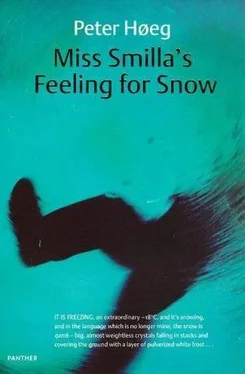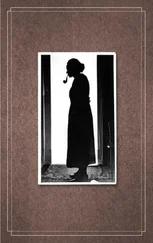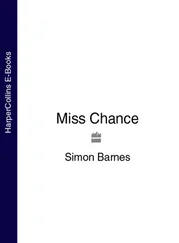Peter Høeg - Smilla's Sense of Snow aka Miss Smilla's Feeling for Snow
Здесь есть возможность читать онлайн «Peter Høeg - Smilla's Sense of Snow aka Miss Smilla's Feeling for Snow» весь текст электронной книги совершенно бесплатно (целиком полную версию без сокращений). В некоторых случаях можно слушать аудио, скачать через торрент в формате fb2 и присутствует краткое содержание. Жанр: Современная проза, на английском языке. Описание произведения, (предисловие) а так же отзывы посетителей доступны на портале библиотеки ЛибКат.
- Название:Smilla's Sense of Snow aka Miss Smilla's Feeling for Snow
- Автор:
- Жанр:
- Год:неизвестен
- ISBN:нет данных
- Рейтинг книги:3 / 5. Голосов: 1
-
Избранное:Добавить в избранное
- Отзывы:
-
Ваша оценка:
- 60
- 1
- 2
- 3
- 4
- 5
Smilla's Sense of Snow aka Miss Smilla's Feeling for Snow: краткое содержание, описание и аннотация
Предлагаем к чтению аннотацию, описание, краткое содержание или предисловие (зависит от того, что написал сам автор книги «Smilla's Sense of Snow aka Miss Smilla's Feeling for Snow»). Если вы не нашли необходимую информацию о книге — напишите в комментариях, мы постараемся отыскать её.
Smilla's Sense of Snow aka Miss Smilla's Feeling for Snow — читать онлайн бесплатно полную книгу (весь текст) целиком
Ниже представлен текст книги, разбитый по страницам. Система сохранения места последней прочитанной страницы, позволяет с удобством читать онлайн бесплатно книгу «Smilla's Sense of Snow aka Miss Smilla's Feeling for Snow», без необходимости каждый раз заново искать на чём Вы остановились. Поставьте закладку, и сможете в любой момент перейти на страницу, на которой закончили чтение.
Интервал:
Закладка:

Peter Høeg
Smilla's Sense of Snow aka Miss Smilla's Feeling for Snow
© 1992
Translated by Tina Nunnally
Part One
The City
1
It's freezing-an extraordinary 0° Fahrenheit -and it's snowing, and in the language that is no longer mine, the snow is qanik-big, almost weightless crystals falling in clumps and covering the ground with a layer of pulverized white frost.
December darkness rises up from the grave, seeming as limitless as the sky above us. In this darkness our faces are merely pale, shining orbs, but even so I can sense the disapproval of the pastor and the verger directed at my black net stockings and at Juliane's whimpering, made worse by the fact that she took disulfiram this morning and is now confronting her grief almost sober. They think that she and I have no respect for either the weather or the tragic circumstances. But the truth is that both the stockings and the pills are each in their own way a tribute to the cold and to Isaiah.
The pastor and the verger and the women surrounding Juliane are all Greenlanders, and when we sing "Guutiga, illimi," "Thou, My Lord," and when Juliane's legs buckle under her and she starts to sob, the volume slowly increasing, and when the pastor speaks in West Greenlandic, taking his point of departure in the Moravians' favorite passage from Ephesians about redemption through His blood, then with only a tiny lapse of concentration you might feel yourself transported to Upernavik or Holsteinsborg or Qaanaaq in Greenland.
But out in the darkness, like the bow of a ship, the walls of Vestre Prison loom; we are in Copenhagen.
The Greenlanders' cemetery is part of Vestre Cemetery. A procession follows Isaiah in his coffin Juliane's friends, who are now holding her upright, the pastor and the verger, the mechanic, and a small group of Danes, among whom I recognize only the social worker and the investigator.
The pastor is now saying something that makes me think he must have actually met Isaiah, even though, as far as I know, Juliane has never gone to church.
Then his voice disappears, because now the other women are weeping along with Juliane.
Many have come, perhaps twenty, and now they let their sorrow wash over them like a black flood, into which they dive and let themselves be carried along in a way that no outsider could understand, no one who has not grown up in Greenland. And even that might not be enough. Because I can't follow them, either.
For the first time I look closely at the coffin. It's hexagonal. At a certain point ice crystals take the same form. Now they are lowering him into the ground. The coffin is made of dark wood, it looks so small, and there is already a layer of snow on it. The flakes are the size of tiny feathers, and that's the way snow is; it's not necessarily cold. What is happening at this moment is that the heavens are weeping for Isaiah, and the tears are turning into frosty down that is covering him up. In this way the universe is pulling a comforter over him, so that he will never be cold again.
The moment the pastor throws earth on the coffin and we are supposed to turn around and leave, a silence falls that seems to last for a long time. The women are quiet; no one moves, it's the sort of silence that is waiting for some thing to burst. From where I'm standing, two things happen.
First, Juliane falls to her knees and puts her face to the ground, and the other women leave her alone.
The second event is internal, inside of me, and what bursts through is an insight.
All along I must have had a comprehensive pact with Isaiah not to leave him in the lurch, never, not even now.
2
We live in the White Palace.
On a piece of donated land the Housing Authority has put up a row of prefabricated white concrete boxes, for which it received an award from the Association for the Beautification of the Capital.
The whole thing, including the prize, makes a cheap and flimsy impression, but there's nothing trivial about the rent, which is so high that the only ones who can afford to live here are people like Juliane, whom the state is supporting; the mechanic, who had to take what he could get; and those living on the edge, like myself.
So the nickname, the White Palace, is something of an insult to those of us who live here, but still basically appropriate.
There are reasons for moving in and reasons for staying here. With time, the water has become important to me. The White Palace is located right on Copenhagen Harbor. This winter I have been able to watch the ice forming.
In November the frost set in. I have respect for the Danish winter. The cold-not what is measured on a thermometer, but what you can actually feel-depends more on the strength of the wind and the relative humidity than on the actual temperature. I have been colder in Denmark than I ever was in Thule in Greenland. When the first clammy rain showers of November slap me in the face with a wet towel, I meet them with fur-lined capucines, black alpaca leggings, a long Scottish skirt, a sweater, and a cape of black Gore-Tex.
Then the temperature starts to drop. At a certain point the surface of the sea reaches 29°F, and the first ice crystals form, a temporary membrane that the wind and waves break up into frazil ice. This is kneaded together into a soapy mash called grease ice and gradually forms free-floating plates, pancake ice, which, on a cold day at noon, on a Sunday, freezes into one solid sheet.
And it gets colder, and I'm happy because I know that now the frost has gained momentum; now the ice will stay, now the crystals have formed bridges and enclosed the salt water in pockets that have a structure like the veins of a tree through which the liquid slowly seeps; not many who look over toward Holmen think about this, but it's one reason for believing that ice and life are related in many ways.
The ice is normally what I look for first when I come up onto Knippels Bridge. But on this December day I see something else. I see a light.
It's yellow, the way most lights are in a city in the winter; and it has been snowing, so even though it's a faint light, it produces a strong reflection. It's shining at the base of one of the warehouses, which in a moment of weakness they decided to let stand when they built our apartment blocks. At the end of the building, toward Strand Street and Christianshavn the blue light of a patrol car is revolving. I can see a police officer. An area temporarily cordoned off with red-and-white tape. Up against the building I can make out what has been blocked off: a small, dark shadow in the snow.
Because I'm running and because it's just barely five o'clock and the evening traffic hasn't tapered off, I get there several minutes ahead of the ambulance.
Isaiah is lying with his legs tucked up under him, with his face in the snow and his hands a'round his head, as if he were shielding himself from the little spotlight shining on him, as if the snow were a window through which he has caught sight of something deep inside the earth.
Surely the police officer ought to ask me who I am and take down my name and address, and in general prepare things for those of his colleagues who will shortly have to start ringing doorbells. But he's a young man with a queasy expression on his face. He avoids looking directly at Isaiah. After assuring himself that I won't step inside his tape, he lets me stand there.
He could have cordoned off a larger area. But it wouldn't have made any difference. The warehouses are in the process of being partially renovated. People and machines have packed down the snow as hard as a terrazzo floor.
Читать дальшеИнтервал:
Закладка:
Похожие книги на «Smilla's Sense of Snow aka Miss Smilla's Feeling for Snow»
Представляем Вашему вниманию похожие книги на «Smilla's Sense of Snow aka Miss Smilla's Feeling for Snow» списком для выбора. Мы отобрали схожую по названию и смыслу литературу в надежде предоставить читателям больше вариантов отыскать новые, интересные, ещё непрочитанные произведения.
Обсуждение, отзывы о книге «Smilla's Sense of Snow aka Miss Smilla's Feeling for Snow» и просто собственные мнения читателей. Оставьте ваши комментарии, напишите, что Вы думаете о произведении, его смысле или главных героях. Укажите что конкретно понравилось, а что нет, и почему Вы так считаете.




![Рута Шепетис - Ashes in the Snow [aka Between Shades of Gray]](/books/414915/ruta-shepetis-ashes-in-the-snow-aka-between-shades-thumb.webp)







